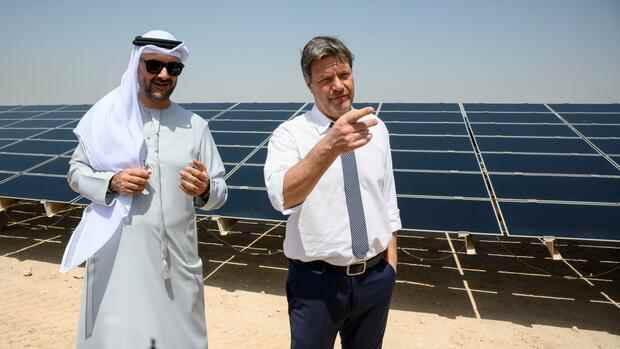The Federal Minister of Economics visited a large-scale solar system near the sustainable urban development project Masdar City.
(Photo: dpa)
The federal government has ostensibly recognized that the Russian attack on Ukraine marks a turning point. The Bundeswehr should suddenly become operational again, and the energy supply should be placed on a broader basis. However, that is far from enough.
Even if the war ends soon, the economic war will continue. If the exports of oil, gas, metals and food from the commodity superpower Russia cease, this will hit the global economy hard. The West must therefore do everything possible to expand supply and reduce demand. The more radical and faster, the better for the world.
Example food: The loss of Russia and Ukraine as important grain exporters threatens to trigger a famine worldwide. The answer must be that we are doing everything we can to increase our own food production. Abandoned areas must be reactivated immediately and existing areas must be designed for maximum yield.
Anyone who, like Federal Minister of Agriculture Cem Özdemir (Greens), emphasizes that the EU’s wheat supply is not at risk and that the “first steps” of European agricultural policy towards promoting climate-friendly and environmentally friendly agriculture should not be reversed are putting the distant goal of climate protection ahead of them the immediate goal of preventing hunger and social unrest in the world’s poorest countries.
Top jobs of the day
Find the best jobs now and
be notified by email.
Putting the humanitarian consequences of this thinking aside, we are playing into the hands of Russia, which would like nothing better than to see a repeat of the Arab Spring with a new migratory movement towards Europe.
Example energy: While it is right that Federal Minister of Economics Robert Habeck (Greens) is opening up new gas supplies from Norway to Qatar, it is just as wrong to rule out the continued operation of the existing German nuclear power plants.
Daniel Stelter is the founder of the discussion forum beyond the obvious, which specializes in strategy and macroeconomics, as well as a management consultant and author. Every Sunday his podcast goes online at www.think-bto.com.
(Photo: Robert Recker/ Berlin)
If the six reactors still in operation in 2021 were to continue to run, this would reduce natural gas requirements by around twelve percent. Nevertheless, after a brief examination, the Federal Ministers of Economics and Environment came to the conclusion that an extension of the service life could make “only a very limited contribution” to solving the problem.
Of course, the gas and coal requirements can be met from sources other than Russia, thus solving the national supply problem. We can afford to pay more. But like refusing additional food production, this comes at the expense of those states that cannot afford it.
We are in a global economic war with Russia. We can only gain that if we think in terms of the war economy and put the impact of our actions on the world community before political projects and taboos in this country.
More: Transatlantic Energy Pact: US President Biden makes firm delivery commitments for liquid gas to the EU.
